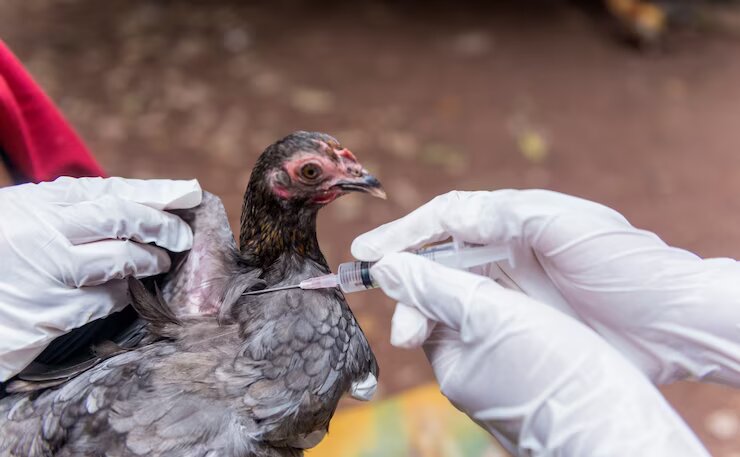Attention all poultry enthusiasts! Are you curious about the science behind chicken vaccinations? As responsible caregivers of our feathered friends, it’s essential to understand how vaccines work and their benefits. In this blog post, we’ll explore everything you need to know about chicken vaccinations – from the different types available to their importance in preventing diseases. So, whether you’re a backyard hobbyist or a commercial farmer, read on for an informative dive into the world of chicken immunization!
What are vaccinations?
Vaccinations are a key part of chicken health, and there are many different types of vaccines available for chickens. Vaccines help protect chickens from diseases and can also help prevent the spread of disease from chicken to chicken. Chickens that are vaccinated typically have a higher survival rate than those that are not vaccinated.
There are two main types of vaccinations for chickens: live and killed vaccines. Live vaccines contain live viruses or bacteria, while killed vaccines contain inactivated viruses or bacteria. Some vaccines may also contain adjuvants, which are substances that help improve the effectiveness of the vaccine.
Vaccinations are typically given to chickens at an early age, typically when they are chicks. However, some vaccinations can be given to older chickens as well. It is important to follow the vaccine schedule recommended by a veterinarian or poultry specialist to ensure that chickens remain properly protected against disease.
How do vaccinations work?
Vaccines work by protecting against infection from specific viruses, bacteria, or other organisms. They work by stimulating the body’s immune system to produce antibodies to these disease-causing agents. Antibodies are proteins that recognize and bind to foreign invaders like viruses and bacteria and help destroy them. The immune system “remembers” these invaders so that if you are ever exposed to them again, your body can more quickly produce the antibodies needed to protect you.
What types of chicken vaccinations are there?
There are two main types of chicken vaccinations: those that protect against infectious diseases and those that protect against non-infectious diseases. Infectious disease vaccinations are typically given to chicken flocks before they are exposed to the disease, while non-infectious disease vaccinations are given to chicken flocks after they have been exposed to the disease.
The most common type of chicken vaccination is the Newcastle Disease Vaccination (NDV), which protects chickens from Newcastle Disease, a highly contagious and often fatal viral respiratory disease. The NDV is typically given to chickens when they are chicks, and it is effective at protecting them from the disease for their entire lives.
Another common type of chicken vaccination is the Infectious Bursal Disease Vaccination (IBDV), which protects chickens from Infectious Bursal Disease, a highly contagious viral disease that can cause severe diarrhea, vomiting, and weight loss in young chickens. The IBDV is typically given to chickens when they are chicks, and it is effective at protecting them from the disease for their entire lives.
Other less common types of chicken vaccinations include those that protect against Marek’s Disease, Infectious Bronchitis, and Avian Influenza. These vaccines are typically given to chickens when they are chicks, and they are effective at protecting them from the diseases for which they are vaccinated.
Why are chicken vaccinations important?
Vaccinations are an important part of keeping chickens healthy. They help protect against diseases that can make chickens sick or even kill them. Chickens can get vaccinated for a variety of diseases, including Marek’s disease, Newcastle disease, and fowlpox.
Vaccinations help ensure that chickens are able to fight off diseases. This is important because if one chicken in a flock gets sick, it can quickly spread to the others. When chickens are vaccinated, they are less likely to get sick and more likely to survive if they do become ill.
Chicken vaccinations are typically given by a veterinarian or poultry specialist. The vaccines are administered through injections or in the form of eye drops. The exact schedule of vaccinations will vary depending on the specific disease being vaccinated against and the age of the chicken. However, most chicken vaccinations should be given at least once a year.
How often do chickens need to be vaccinated?
Vaccinations are an important part of keeping your chickens healthy. But how often do they need to be vaccinated?
The answer depends on the vaccine and the disease it protects against. Some vaccines are given only once, while others may need to be given annually or even more frequently. Your veterinarian can help you determine the best vaccination schedule for your flock.
Here are some general guidelines:
Chickens should be vaccinated for Marek’s disease at 6 weeks of age, and then again at 12 weeks. A booster shot is generally not needed unless there is a high risk of exposure, such as when new birds are introduced to the flock.
Most other vaccines are given as a series of two shots, with the second shot being given 4-6 weeks after the first. A booster shot is then usually given annually.
Some vaccines, such as those for Newcastle disease and avian influenza, may need to be given more frequently if there is a high risk of exposure in your area. Again, your veterinarian can help you determine the best vaccination schedule for your flock.
Are there any risks associated with chicken vaccinations?
Are there any risks associated with chicken vaccinations?
Just like with any other vaccine, there is always a small risk of an adverse reaction to a chicken vaccination. The most common side effects are mild and may include redness or swelling at the injection site, lethargy, decreased appetite, and/or fever. More serious side effects are very rare, but can include anaphylactic shock and death. Talk to your veterinarian about the potential risks and benefits of chicken vaccinations before making a decision for your flock.
Conclusion
Vaccinating chickens is an essential step to ensure the health of your flock and to help prevent the spread of poultry diseases. Understanding the science behind vaccinations can help you make informed decisions about which vaccines are appropriate for your chickens and how often they should be administered. With a bit of knowledge, you can take active steps towards protecting your flock from illness and improve their overall health.
Debunking Myths and Misconceptions: Understanding the Truth Behind Covid’s Origins
As the world continues to grapple with the Covid-19 pandemic, theories about its origins have flooded our newsfeeds and sparked heated debates. But with so much conflicting information out there, it’s easy to feel confused and overwhelmed. That’s why we’re here today – to dive deep into the facts and debunk common myths surrounding Covid’s origins. From lab leaks to animal transmission, we’ll explore what we know (and don’t know) about this deadly virus, separating fact from fiction once and for all. So buckle up, take a deep breath, and let’s get started on demystifying one of the biggest mysteries of our time!
What is the coronavirus?
The coronavirus is a virus that primarily affects the respiratory system. It is a member of the family of viruses that includes the common cold and the flu. The coronavirus is spread through contact with respiratory secretions, such as saliva, mucus, or blood, from an infected person. It can also be spread through contact with objects or surfaces that have been contaminated with the virus. The virus can cause severe respiratory illness, including pneumonia, and can be fatal. Early symptoms of the coronavirus include fever, coughing, and difficulty breathing.
Where did the coronavirus come from?
The coronavirus that causes COVID-19 is believed to have originated in bats. However, the exact origin of the virus is still unknown. The first cases of COVID-19 were reported in China in December 2019, and the virus has since spread to over 200 countries and territories.
Who is most at risk from the coronavirus?
There are many factors that contribute to someone’s risk of contracting the coronavirus, including age, underlying health conditions, and exposure to the virus. However, certain groups of people are more likely to experience severe illness if they contract the virus, including older adults, pregnant women, and people with chronic medical conditions like heart disease, diabetes, and lung disease.
While anyone can develop severe illness from the coronavirus, some people are more at risk than others. Older adults and people with chronic medical conditions are more likely to experience complications from the virus, and pregnant women may also be at a higher risk. It’s important for everyone to take steps to protect themselves from the virus, but those in high-risk groups should be especially cautious.
If you’re over the age of 60 or have a chronic medical condition, it’s important to take extra precautions to avoid exposure to the coronavirus. Limit your time in public places, wear a face mask when around others, and wash your hands often. If you must go out in public, try to avoid close contact with people who are sick and stay six feet away from others as much as possible. These simple measures can help protect you from contracting the virus or experiencing severe illness if you do become infected.
What are the symptoms of the coronavirus?
The symptoms of the coronavirus are fever, coughing, and difficulty breathing. These symptoms can appear anywhere from two to fourteen days after exposure to the virus. The majority of people who become infected will only experience mild symptoms, however, some people may develop more severe respiratory illness, such as pneumonia. In rare cases, death can occur. Symptoms of the coronavirus are similar to those of other respiratory illnesses, such as the flu or a cold, so it can be difficult to diagnose without a test. If you think you may have been exposed to the coronavirus, it is important to see your healthcare provider and get tested.
How can you protect yourself from the coronavirus?
One of the best ways to protect yourself from the coronavirus is to get vaccinated. The CDC recommends that everyone over the age of six months get a flu vaccine every year. There are two types of vaccines available: the trivalent vaccine, which protects against three strains of influenza, and the quadrivalent vaccine, which protects against four strains. The quadrivalent vaccine is recommended for people over the age of 65 and for anyone with certain medical conditions, such as heart disease or asthma.
In addition to getting a flu vaccine, you can also take steps to prevent the spread of infection. Wash your hands often with soap and water for at least 20 seconds, or use an alcohol-based hand sanitizer if soap and water are not available. Avoid touching your eyes, nose, and mouth with unwashed hands. Cover your coughs and sneezes with a tissue or your sleeve (not your hands). Avoid close contact with people who are sick. And clean and disinfect surfaces that are frequently touched, such as doorknobs, light switches, and countertops.
If you are sick with flu-like symptoms, stay home for at least 24 hours after your fever has gone down without the use of fever-reducing medication. This is to prevent you from spreading the virus to others.
What is the treatment for the coronavirus?
There is currently no specific treatment for the coronavirus, and there is no vaccine available to prevent its spread. Treatment focuses on relieving symptoms and supporting the respiratory system. This can be done with supportive care, such as oxygen therapy and pain relief medication. In severe cases, hospitalization may be necessary to provide more intensive respiratory support. There is ongoing research into potential treatments for the coronavirus, but at this time there is no cures or prevention methods available.
Are there any long-term effects of the coronavirus?
The coronavirus is a novel virus and, as such, we do not yet know all of its long-term effects. However, preliminary research suggests that the virus may cause long-term immunosuppression, which could make people more susceptible to other infections in the future. Additionally, the virus may cause long-term damage to the lungs and other organs. While more research is needed to understand all of the potential long-term effects of the coronavirus, it is clear that this virus has the potential to cause serious health problems down the road.
Conclusion
Understanding the truth behind Covid’s origins is key to our efforts in fighting this global pandemic. We must continue to challenge the myths and misconceptions that have been propagated about its origin, as they can create confusion and impede our progress towards a better future. With accurate information at hand, we are empowered to act more safely and responsibly while taking steps towards improving public health outcomes. By staying informed, we can all make sure that everyone remains safe during these trying times.












